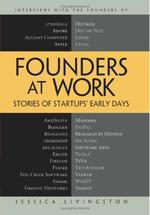 I recently read the fascinating 'Founders at work' by Jessica Livingstone, which has interviews with a range of tech start-up people. The insights are interesting, although I would say it's hard to draw many general rules for success from the book. Here are some observations:
I recently read the fascinating 'Founders at work' by Jessica Livingstone, which has interviews with a range of tech start-up people. The insights are interesting, although I would say it's hard to draw many general rules for success from the book. Here are some observations:
- Working with friends or people you find interesting is the starting point, not the technology or idea, which often comes later. This seems to me something we rarely take on board as individuals or organisations. Several interviewees said they met some people at college and knew they wanted to do something with them, but didn't know what.
- It's a young man's game. Not many women in the book, and not many 40 year old professors either. Being prepared to literally sleep at work and share your house with your co-founders seems to be common. Many interviewees reported how they only saw their workmates, they lived together, socialised together, but mostly worked together. You can only do this when you're fresh out of college and don't have a family. 'Work-life balance' is not a phrase you'd hear often.
- Money isn't the motivating factor. Sure most of the founders dreamed of success and riches, but that wasn't their main motivation. It was passion for the technology they were building or the vision they had for it.
- Luck is a big factor. Not many of the founders had gone on to have repeated success, maybe because they weren't as motivated this time around and had acquired a family, but also because as many of them suggest, luck is a major factor in success. Often it will be a small decision that has big consequences, or a chance meeting, or an opportune moment in the market.
- Get bought out by a big player is a common business model. I want to explore this in a later post, but for many of those interviewed they only really had financial success when Microsoft (or someone similar) bought them out for X million. This doesn't really constitute a business model to me, as it isn't really generating revenue from your product, just hoping someone with lots of spare cash goes in to acquisition frenzy because they need to clear some accounts.
If you haven't read it, then it's worth a read. Be warned though, you might feel a tad envious the next time you get your more modest pay.
Comments